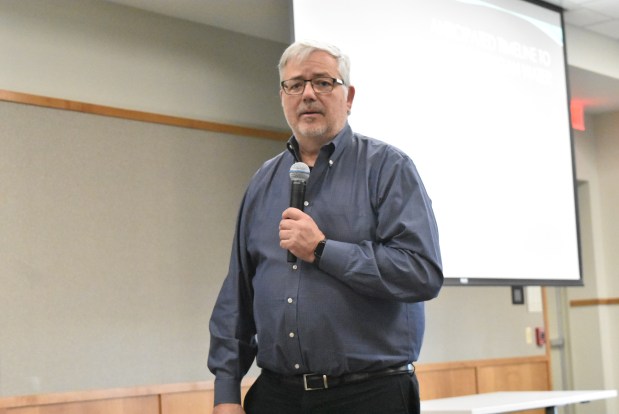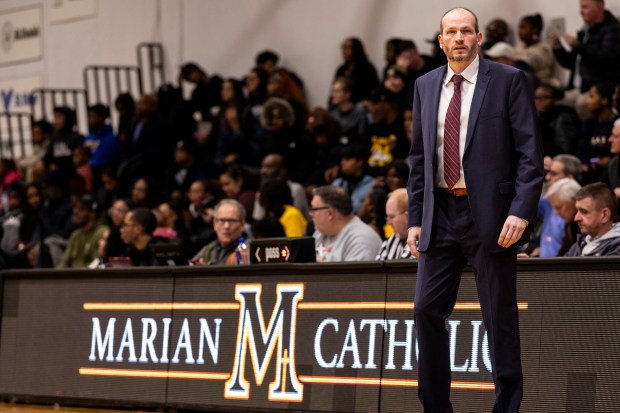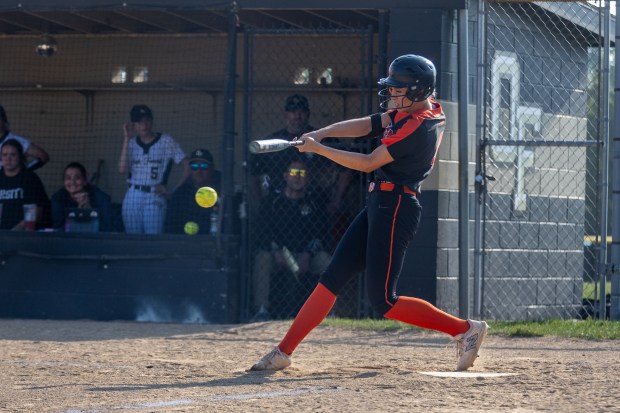Lake Zurich officials held a community meeting on Monday about the ongoing switch to Lake Michigan drinking water and addressed any community concerns over the $154 million infrastructure project.
The project will take another four years to complete and, since last year, water rates have been creeping up — and will continue until 2028 — to pay for a debt the village will owe for decades. Yet, despite all that, in a room with about two dozen residents, nobody attending the meeting expressed any concern over the plan and all who spoke supported the move to lake water.
The community discussions kicked off years ago and village leaders always presented the switch to Lake Michigan water as an expensive proposal — albeit a necessary one with several benefits that will cost about as much as any alternative.
Village leaders focused again on that theme from the top of the meeting.
“A lot of that stuff isn’t proven and the cost is about the same,” Assistant Village Manager Michael Duebner said of alternatives. “So do we want to have a solution that’s not proven and the cost is about the same, or do we want to go to Lake Michigan water?”
The village also brought some good financial news to the community.
Earlier this month, village trustees voted to raise sales tax by half a penny, to 1 % and that money will go toward paying off the water project bill. About 40 % of village sales go to non-residents, meaning that much of that money will not come from locals and residents will see their water bills decline as that revenue ramps up.
“With the half-cent sales tax added on, that’s going to pay for a third, and the other two-thirds is going to be loaded onto the water rate,” said Village Administrator Ray Keller. He added that more cash should be coming in as the town grows so “we can reduce the amount we are financing and in that final year the board may be able to reduce the cost.”
The initial plan had been for the rates to go up $3 per 1,000 gallons every year until 2028 when it would top out at $15, though that should now come down to $10 per 1,000 gallons per household due to the sales tax. Rates went up this year in January and the sales tax and rate hike are set to begin in January next year.
Mayor Poynton reminded residents again that property tax would not — and legally cannot — pay for the water system as that money goes into the general fund and not the water fund.
For Lake Zurich the move has come after the EPA reduced acceptable levels of radium in drinking water in 2000 and due to barium in the village’s drinking water sources. Those regulations plus the legal cap on water usage in Lake Michigan meant communities drawing lake water is capped — and if Lake Zurich didn’t make a move soon, the water rights would go elsewhere and already communities far afield are planning to use Lake Michigan water.
“Joliet is 70 miles from Chicago and they’re building a pipeline to the lake,” said Central Lake County Joint Action Water Agency (CLCJAWA) Executive Director Bill Soucie, the head of the CLCJAWA. “They’re spending over $2 billion for that pipeline to get water to Joliet.”
The CLCJAWA is the water association Lake Zurich joined and it’s one of the loan sources for Lake Zurich’s project.
Soucie invited anyone from the public to visit the CLCJAWA website and look at the water quality and call the group up to tour the facility.
“We know more about our water than anyone and we like to disclose it to the community before anyone and it’s on our website,” Soucie said.
In addition, the village maintains a website for the project along with frequently asked questions and answers and email and phone numbers for residents to call with questions.
Jesse Wright is a freelance reporter for Pioneer Press.





